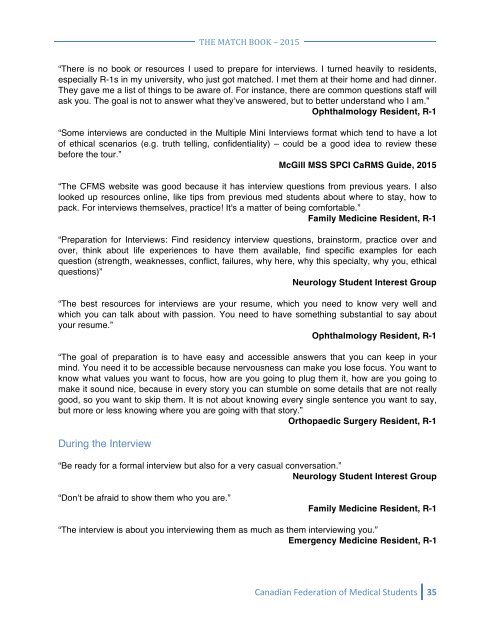The Match Book
CFMS_Match_Book_2015
CFMS_Match_Book_2015
Create successful ePaper yourself
Turn your PDF publications into a flip-book with our unique Google optimized e-Paper software.
THE MATCH BOOK – 2015 <br />
“<strong>The</strong>re is no book or resources I used to prepare for interviews. I turned heavily to residents,<br />
especially R-1s in my university, who just got matched. I met them at their home and had dinner.<br />
<strong>The</strong>y gave me a list of things to be aware of. For instance, there are common questions staff will<br />
ask you. <strong>The</strong> goal is not to answer what they’ve answered, but to better understand who I am.”<br />
Ophthalmology Resident, R-1<br />
“Some interviews are conducted in the Multiple Mini Interviews format which tend to have a lot<br />
of ethical scenarios (e.g. truth telling, confidentiality) – could be a good idea to review these<br />
before the tour.”<br />
McGill MSS SPCI CaRMS Guide, 2015<br />
“<strong>The</strong> CFMS website was good because it has interview questions from previous years. I also<br />
looked up resources online, like tips from previous med students about where to stay, how to<br />
pack. For interviews themselves, practice! It's a matter of being comfortable.”<br />
Family Medicine Resident, R-1<br />
“Preparation for Interviews: Find residency interview questions, brainstorm, practice over and<br />
over, think about life experiences to have them available, find specific examples for each<br />
question (strength, weaknesses, conflict, failures, why here, why this specialty, why you, ethical<br />
questions)”<br />
Neurology Student Interest Group<br />
“<strong>The</strong> best resources for interviews are your resume, which you need to know very well and<br />
which you can talk about with passion. You need to have something substantial to say about<br />
your resume.”<br />
Ophthalmology Resident, R-1<br />
“<strong>The</strong> goal of preparation is to have easy and accessible answers that you can keep in your<br />
mind. You need it to be accessible because nervousness can make you lose focus. You want to<br />
know what values you want to focus, how are you going to plug them it, how are you going to<br />
make it sound nice, because in every story you can stumble on some details that are not really<br />
good, so you want to skip them. It is not about knowing every single sentence you want to say,<br />
but more or less knowing where you are going with that story.”<br />
Orthopaedic Surgery Resident, R-1<br />
During the Interview<br />
“Be ready for a formal interview but also for a very casual conversation.”<br />
Neurology Student Interest Group<br />
“Don’t be afraid to show them who you are.”<br />
Family Medicine Resident, R-1<br />
“<strong>The</strong> interview is about you interviewing them as much as them interviewing you.”<br />
Emergency Medicine Resident, R-1<br />
Canadian Federation of Medical Students 35


